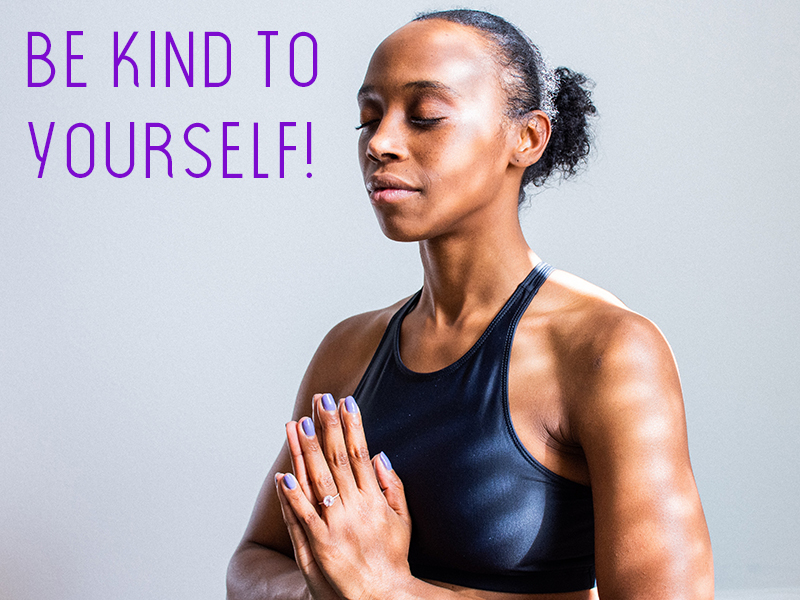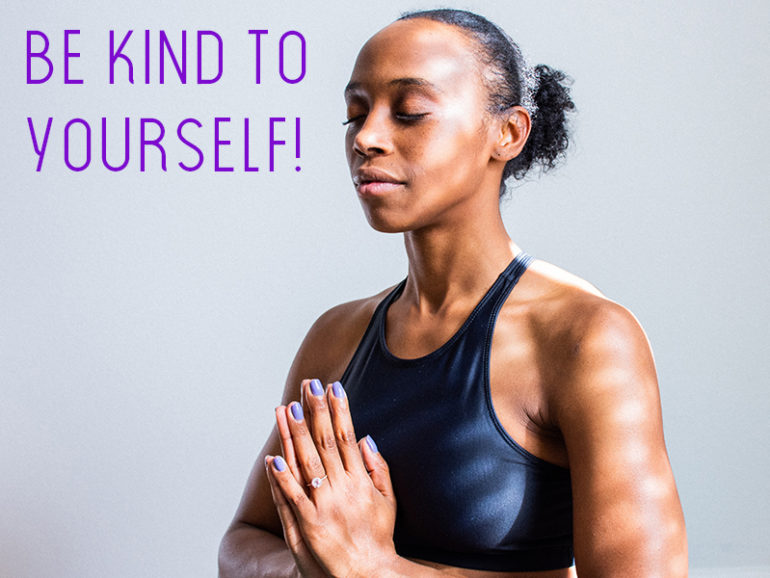Emily explores how developing self-compassion can help make life smoother

Being kind to ourselves is something that a lot of womxn struggle with. The pressures of social media, busy lifestyles, career climbing, expectations of achieving a certain body (will thin ever not be ‘in’?)… it’s enough to make the most secure of us feel stressed out.
For LGBTQ+ womxn the pressures can be magnified. It’s a sobering fact that people within the LGBTQ+ community are at a high risk of having mental health issues. Stonewall reports that 52%of LGBTQ+ people had been depressed over the last year.
Data released at the end of 2019 showed that 14,491 crimes were committed against LGBTQ+ people because of their sexuality in the UK. The fear of stigma and discrimination can seriously batter your sense of self. When the world seems cold and uncaring what can LGBTQ+ womxn do
Welcome compassion into your life every day by building your ability to be compassionate to the person who matters most: you.
What is self-compassion?
Self-compassion is a term that many people use interchangeably with self-esteem, but the two are not exactly the same. Self-esteem tends to focus on your self-worth and how much you value yourself, which is, of course, extremely important. But self-esteem is often tied to sources external to you – what job you do, how you look, what you have achieved in life. For that reason, people can find their self-worth goes up and down depending on how they feel about their external circumstances.
Leah Sian Davies is the founder of Fresh Air Fridays, who work with individuals and businesses to support people to take care of their wellbeing. She says, “I think self-compassion when we are struggling in life can be one of the hardest things to give ourselves, but is essential if we are to build resilience and trust in ourselves. If we can imagine how we would treat a friend or someone we really care about when they are struggling that gives a window into what we need to give ourselves.”
So….How compassionate are you?
Kristen Neff, an associate professor of educational psychology at the University of Texas, has a longstanding interest in self-compassion. She wrote a book called Self-compassion and her Ted Talk on the spaces between self-esteem and self-compassion has reached nearly two million people.
In the talk, Kirsten explains that “self-compassion is not a way of judging ourselves positively, self-compassion is a way of relating to ourselves kindly, embracing ourselves as we are, flaws and all.”
You can tell how kind you are to yourself by examining how you speak to yourself and how you treat yourself, no matter what’s happening for you at the time. For example, you might feel great about yourself and enjoy positive self-talk when you feel important areas of your life, like your career, are going well.
Or you might self-care really well whenever you feel happy and healthy. You might go to the gym, eat healthy food, and spend time with people who lift you up. But when you feel down you beat yourself up or focus on your flaws and berate yourself.
The following questions designed by Neff can help you to get a handle on whether this is true for you:
“I’m disapproving and judgmental about my own flaws and inadequacies?”
“When I fail at something important to me I become consumed by feelings of inadequacy”
“I try to be loving towards myself when I’m feeling emotional pain”
If you know that your answers are along the lines of – yes, no, no – then you probably have an issue with being compassionate to yourself!
Tips for compassionate self-care
Developing self-compassion is an ongoing process and involves figuring out where your stress points are and how you can treat yourself more kindly.
Being self-compassionate means changing both the way you speak to yourself and the ways you take care of yourself in the activities you choose to do. Getting over resistance to being kind to yourself can play a part.
Sian says ‘I think some of the barriers to self-compassion can be the idea that it’s selfish, that if we are kind towards ourselves then we will care less about others. Actually it tends to be the opposite. If we are kind towards ourselves and give ourselves the care that we need, we are in a better place to care for others because we have more energy and attention for them.”
Stress point challenge
Take a look at the following questions and ask yourself whether the answer to each question is yes or no (or sometimes!)
- I accept my body, even when I want to change things or make adjustments to my physique
- I take care of my body, even when it disappoints me (for example if I don’t weigh what I want, or am experiencing an issue with my physical health)
- I am happy with my work, even if I don’t achieve everything I want to
- I am able to talk kindly to myself, even if something has gone wrong
- I’m ok with how other people feel about me, even if they dislike me
- When life gets busy I make taking care of myself a priority
- Most of my internal chatter about myself is positive
- If someone treats me badly I blame myself
- When I screw up I easily forgive myself
Asking yourself these kinds of questions can help you to understand which areas of your life you struggle with the most.
Daily self-compassion
Try these simple daily self-compassion steps:
- Take time each day to check in with yourself and catch what your internal monologue is saying. Often we don’t realise the kind of negative self-chatter we are regularly taking part in until we stop to notice it.
- Spend at least ten minutes each day noticing everything around you that brings you calm and joy. See if you can notice similar things about yourself. If you can’t right away, don’t worry. Set yourself a task to start working towards noticing.
- Practice forgiving yourself, especially if you are very hard on yourself. Start small – it’s easy to carry around shame from impactful events, and if this is the case for you, begin by forgiving yourself for smaller, less emotionally charged mistakes.
- Check in with yourself during your working day. Are you taking time out from a busy schedule to give yourself some self-care? Going for a short walk on your lunch break, finding somewhere quiet to do some deep breathing, or ensuring that you ask for help and support when needed can all work wonders during each working day.
- Remind yourself every morning that you are enough, and that how you treat yourself matters. A great tip to remind you is to write the words “I am enough” on a mirror (you can use lipstick – it cleans off easily!).

